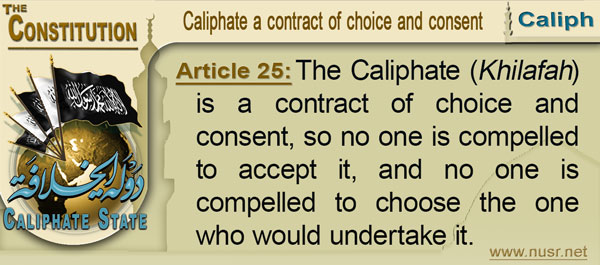
Article 25: The Khilafah is a contract of choice and consent, so no one is compelled to accept it, and no one is compelled to choose the one who would undertake it.
The proof for this is the evidence that any Shari’ah contract is completed between two parties since it is a contract like all the other contracts. On top of that, the narration of the Bedoin gave the pledge of allegiance to Allah's Prophet  for Islam. Then the Bedoin got fever at Medina, came to Allah's Prophet and said, "O Allah's Prophet! Cancel my Pledge," But Allah's Prophet
for Islam. Then the Bedoin got fever at Medina, came to Allah's Prophet and said, "O Allah's Prophet! Cancel my Pledge," But Allah's Prophet  refused. Then he came to him (again) and said, "O Allah's Prophet! Cancel my Pledge." But the Prophet
refused. Then he came to him (again) and said, "O Allah's Prophet! Cancel my Pledge." But the Prophet  refused. Then he came to him (again) and said, "O Allah's Prophet! Cancel my Pledge." But the Prophet refused. The Bedouin finally went out (of Medina) whereupon Allah's Prophet
refused. Then he came to him (again) and said, "O Allah's Prophet! Cancel my Pledge." But the Prophet refused. The Bedouin finally went out (of Medina) whereupon Allah's Prophet  said,
said,
«إِنَّمَا الْمَدِينَةُ كَالْكِيرِ تَنْفِي خَبَثَهَا وَيَنْصَعُ طَيِّبُهَا»
"Medina is like a pair of bellows (furnace): It expels its impurities and brightens and clears its good.” (agreed upon by Muslim and Al-Bukhari). As the pledge upon the Khilafah is a pledge upon obedience to the one who has the right to be obeyed from the people of authority, then it is a contract upon choice and consent, and so it is not correct by compulsion; neither compulsion on the one given the pledge nor compulsion upon those who are giving the pledge due to the words of the Messenger :
«إِنَّ اللَّهَ وَضَعَ عَنْ أُمَّتِي الْخَطَأَ وَالنِّسْـيَانَ وَمَا اسْـتُكْرِهُوا عَلَيْهِ»
“Allah has forgiven my nation (Ummati) for mistakes and forgetfulness, and what they are forced to do.” (reported by Ibn Maja through Ibn ‘Abbas), and this is general for every contract including the contract of the Khilafah. Accordingly, every contract that occurs due to compulsion is void, since it has not been contracted. In the same manner as the other contracts, the Khilafah is not contracted by compulsion.
Likewise, the Khilafah is not completed except with two contracting parties like any other contract; so, someone would not be a Khalifah unless someone appoints him to the Khilafah, and so if someone appoints themselves as Khalifah without a pledge from those whom the Khilafah is contracted through, he would not be a Khalifah unless they gave him the pledge with satisfaction and consent, in which case he becomes Khalifah after this pledge; as for before it then he would not be considered such. If the people are forced to give the pledge, the person would not be the Khalifah after this pledge which was taken by compulsion, and the Khilafah would not be contracted to him since it is a contract which is not contracted through compulsion due to the words of the Messenger :
«إِنَّ اللَّهَ وَضَـعَ عَـنْ أُمَّـتِي الْخَطَأَ وَالنِّـسْـيَانَ وَمَا اسْـتُكْرِهُوا عَلَيْهِ»
“Allah has forgiven my nation (Ummati) for mistakes and forgetfulness, and what they are forced to do.” , and what has been forgiven is considered to be void.

